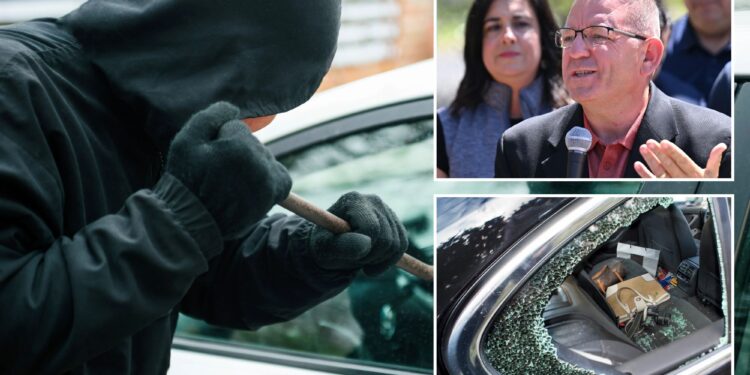
Republican lawmakers want to make it easier to lock up car thieves as a historic rise in stolen vehicles continues to slam New Yorkers.
New legislation introduced by Staten Island Assemblyman Michael Reilly (R-Staten Island) would increase the penalty for repeat car thieves, including making the crimes bail eligible.
Big Apple car thefts have soared recently, escalating to 13,500 stolen vehicles last year – the highest since 2006.
“What this legislation is going to do, it’s going to address and help law enforcement combat that,” Reilly told reporters outside the 122 NYPD Precinct Friday.
Reilly’s bill would allow a repeat car thief to be charged with aggravated grand larceny, a felony that allows judges to hold someone in custody under New York’s lax bail laws. It would also give district attorneys the ability to request judges try 16 and 17-year-old offenders be tried as adults.
“These individuals know that they can get away with anything,” Staten Island Borough President Vito Fosello, said alongside Reilly.
“If you steal a car, whether it be on Staten Island or anyplace across the state, it’s a joke,” Fosello continued. “You get a slap on the wrist, if you get anything. And last summer in particular. It was like happy hunting season, where sometimes people got two cars stolen from their house in a single day. And if you caught him and you’re lucky, nothing happened!”
Car thefts have been on the rise in recent years, with the problem further exacerbated by a TikTok trend showing how to bypass anti-theft devices in Kia and Hyundai vehicles.
Reilly’s legislation is carried by Sen. Andrew Lanza (R-Staten Island) in the state Senate.
Last year, Gov. Kathy Hochul rolled out an effort to beef up law enforcement to handle the wave of Kia and Hyundai-related thefts.
“Our local law enforcement, who wants to be out there solving other crimes has had to be diverted, their attention diverted, our criminal justice system diverted, because of this phenomenon,” Hochul said announcing her initiative in September.
Hochul’s initiative included $50 million in targeted funding to support law enforcement technology.



























